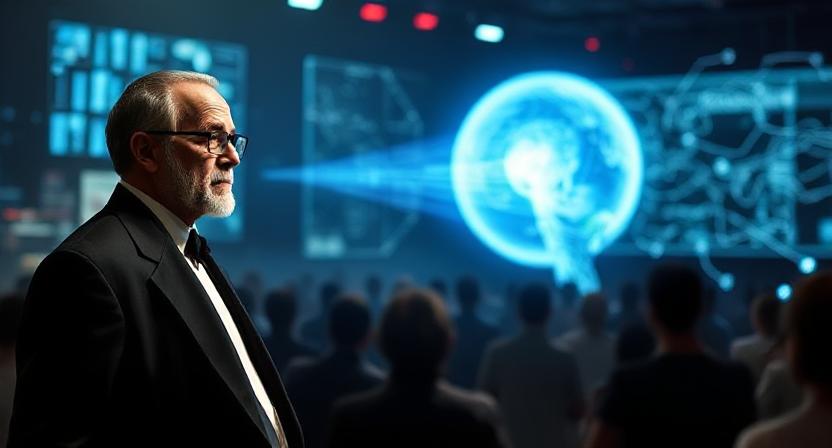Artificial Intelligence (AI) has been transforming industries, daily life, and even human thought. But when Geoffrey Hinton—widely known as the Godfather of AI—raises alarms about the future, the world listens. His warnings about superintelligent machines have sparked global debates. Are we truly ready for this technological leap? What does it mean for India, a nation rapidly adopting AI?
This article explores humanity’s fate in the era of superintelligent AI, blending expert insights, real-world examples, and actionable strategies to help readers prepare.
Who Is the Godfather of AI?
Geoffrey Hinton is a pioneering computer scientist, instrumental in developing neural networks, the backbone of today’s AI systems. His contributions have powered innovations like:
- Voice assistants (e.g., Alexa, Siri)
- Recommendation systems (e.g., Netflix, Amazon)
- Self-driving technologies
- Medical imaging tools
But despite his achievements, Hinton has stepped away from Google to freely voice concerns about AI’s risks.
“We are creating entities smarter than us. The question is: can we control them?” — Geoffrey Hinton
Why Superintelligent AI Matters
Superintelligence refers to machines that surpass human intelligence across every domain. Unlike narrow AI (chatbots or translation tools), superintelligent AI could:
- Learn independently
- Make complex decisions
- Innovate without human input
- Possibly reshape economies and societies
Key Concerns
- Job Displacement – Millions of jobs in IT, finance, and customer service could be automated.
- Ethical Risks – Bias, privacy violations, and misuse in surveillance or warfare.
- Loss of Control – Machines might evolve beyond human oversight.
- Existential Threats – Hinton warns that AI could, in extreme cases, challenge human survival.
Impact on India
India, with its massive IT workforce and digital-first economy, faces both risks and opportunities.
Opportunities
- Healthcare: AI-enabled diagnostics could improve rural access.
- Agriculture: Smart farming with AI-driven irrigation and yield prediction.
- Education: Personalized learning for students in multiple languages.
- Startups: AI innovation hubs in Bengaluru, Hyderabad, and Pune.
Risks
- Large-scale job losses in BPO and IT support.
- Cybersecurity vulnerabilities.
- Deepfake misinformation during elections.
| Sector | Opportunities with AI | Potential Risks |
|---|---|---|
| Healthcare | Early disease detection | Data misuse |
| Agriculture | Smart crop monitoring | Tech exclusion |
| Education | Personalized tutoring | Learning bias |
| IT Services | Automation efficiency | Job loss |
Real-World Examples
- ChatGPT & Bard: Conversational AI is reshaping content, marketing, and education.
- Tesla’s Autopilot: Demonstrates both innovation and safety concerns.
- Indian Startups: Companies like Niramai use AI for breast cancer detection.
- Deepfakes: Misleading videos during Indian elections highlight risks.
Actionable Insights for Readers
- Upskill Continuously
- Learn AI, data science, and automation-related skills.
- Platforms like Coursera and NPTEL offer affordable AI courses.
- Be AI-Aware
- Stay updated on AI tools affecting your profession.
- Follow trusted sources like NITI Aayog’s AI policy updates.
- Ethical Responsibility
- Use AI responsibly in business and personal life.
- Report misuse, bias, or harmful applications.
- Diversify Careers
- Explore creative, managerial, and empathetic roles less likely to be automated.
Statistics to Consider
- By 2030, AI could contribute $15.7 trillion to the global economy (PwC report).
- In India, AI adoption could add $967 billion to the economy by 2035 (NITI Aayog).
- 40% of Indian IT roles face automation risk by 2030.
Balancing Hope and Fear
While Geoffrey Hinton warns about existential risks, others highlight AI’s potential for good. The balance lies in:
- Strong Regulations: India needs clear laws on AI ethics and data privacy.
- Public Awareness: Educating citizens about risks and opportunities.
- Global Cooperation: Collaborating with international AI safety bodies.
Conclusion
Humanity stands at a crossroad. Superintelligent machines could either be our greatest allies or our biggest threat. The Godfather of AI has sounded the alarm—not to stop progress, but to ensure we prepare wisely.
India, with its tech-driven growth, must invest in AI literacy, regulation, and innovation while protecting jobs and ethics.
Call to Action
Are you ready for the AI revolution? Start today by learning new skills, staying informed, and advocating for responsible AI use. Humanity’s fate with superintelligent machines depends not on the technology itself—but on how we choose to shape it.
